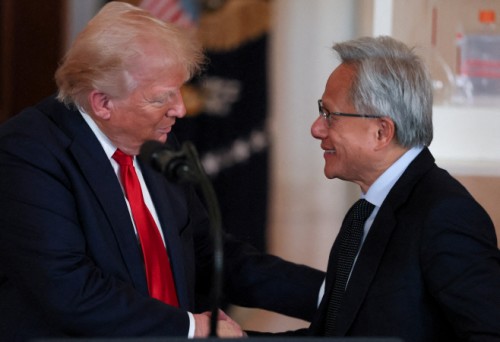 |
| U.S. President Donald Trump (left) shakes hands with Nvidia CEO Jensen Huang during an “Invest in America” event at the White House in Washington, D.C., on April 30. / Reuters-Yonhap |
The Trump administration’s decision to allow Nvidia’s H20 artificial intelligence (AI) chip exports to China was part of a negotiated trade-off with Beijing over rare earth export controls, senior U.S. officials said on July 15.
Treasury Secretary Scott Bessent and Commerce Secretary Howard Lutnick explained that China agreed to lift restrictions on rare earth exports to the U.S. in exchange for limited AI chip sales, specifically lower-spec Nvidia H20 chips.
Lutnick emphasized that the H20 is Nvidia’s “fourth-tier” chip—not its most advanced—and that allowing its export ensures China remains dependent on U.S. technology. “We want China to stay reliant on our technology stack,” he said in a CNBC interview.
Following the announcement, Nvidia’s stock surged 4.04% to $170.70 per share on the New York Stock Exchange, pushing its market capitalization to $4.16 trillion—over $1 trillion ahead of Apple.
The agreement stems from high-level trade talks between the U.S. and China in London on June 9–10, involving top officials including Treasury Secretary Bessent, Commerce Secretary Lutnick, and U.S. Trade Representative Jamieson Greer, along with Chinese Vice Premier He Lifeng and Commerce Minister Wang Wentao.
“The deal was struck while finalizing a rare-earth magnet agreement with China,” Lutnick said. Bessent added that the U.S. used the H20 export approval as a negotiating chip, describing the talks as similar to tactics employed in Geneva and London trade rounds.
Nvidia CEO Jensen Huang (Chinese name: Huang Renxun) played a pivotal role in securing the deal. During a private meeting at the White House on July 10, he personally appealed to President Trump to allow Nvidia to continue selling chips to China and maintain access to Chinese AI talent, according to The Wall Street Journal.
Huang argued that restricting Nvidia's access would give Chinese companies like Huawei a major edge. His long-held view is that selling slightly older chips to China will deter Beijing from investing heavily in domestic alternatives and infrastructure, ultimately preserving U.S. dominance.
President Trump, who previously praised Huang as “my friend” during an April event in Saudi Arabia, appears to have been receptive to that argument. According to Reuters, Nvidia is also preparing to launch a new China-specific graphics card, the “RTX Pro,” designed to fully comply with U.S. export rules.
AI and crypto policy czar David Sacks, appointed by Trump, echoed the strategy during a Bloomberg TV interview. “If Huawei gains dominance in China and uses that revenue to fund R&D, we’ll be boosting their capabilities,” he warned.
Sacks argued that barring U.S. firms from certain markets would push allies into China’s orbit. “This is a zero-sum game. If Nvidia doesn’t win the market share, Huawei will,” he said.
He added that ensuring U.S. technologies—from semiconductors and operating systems to AI models in data centers—remain the global standard is akin to maintaining the dollar’s status as the world’s reserve currency.
Most Read
-
1
-
2
-
3
-
4
-
5
-
6
-
7





















